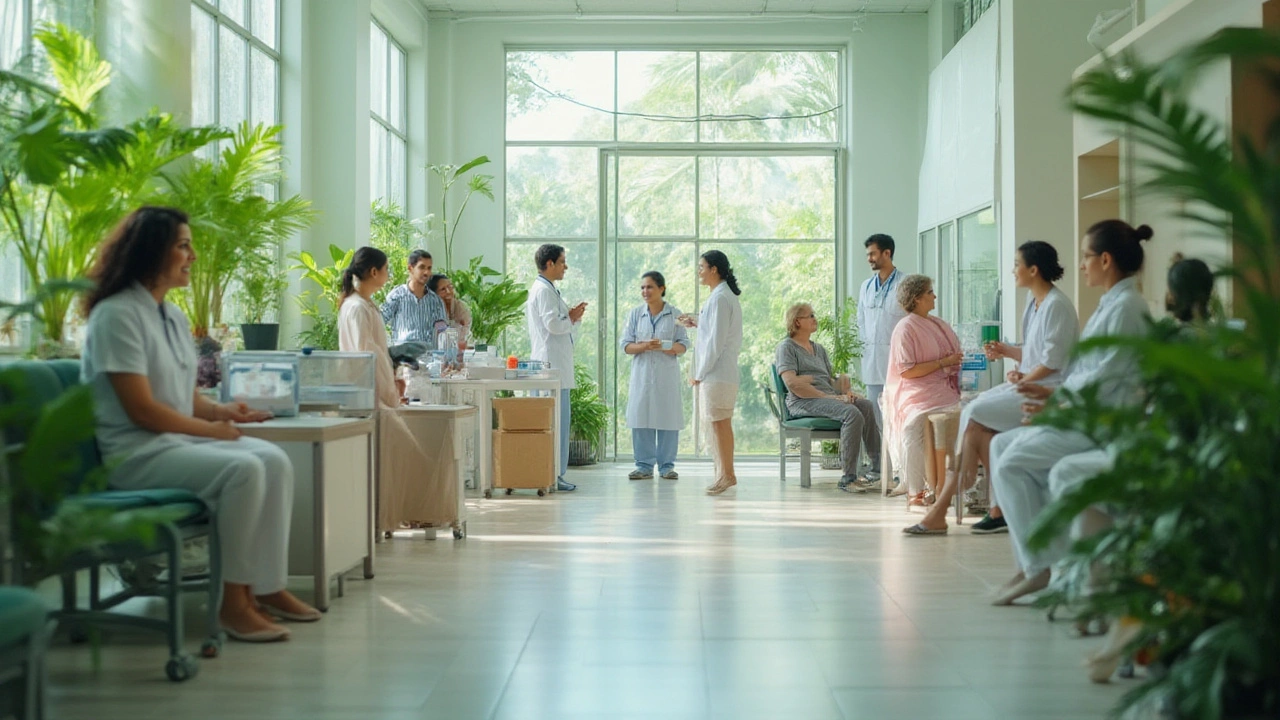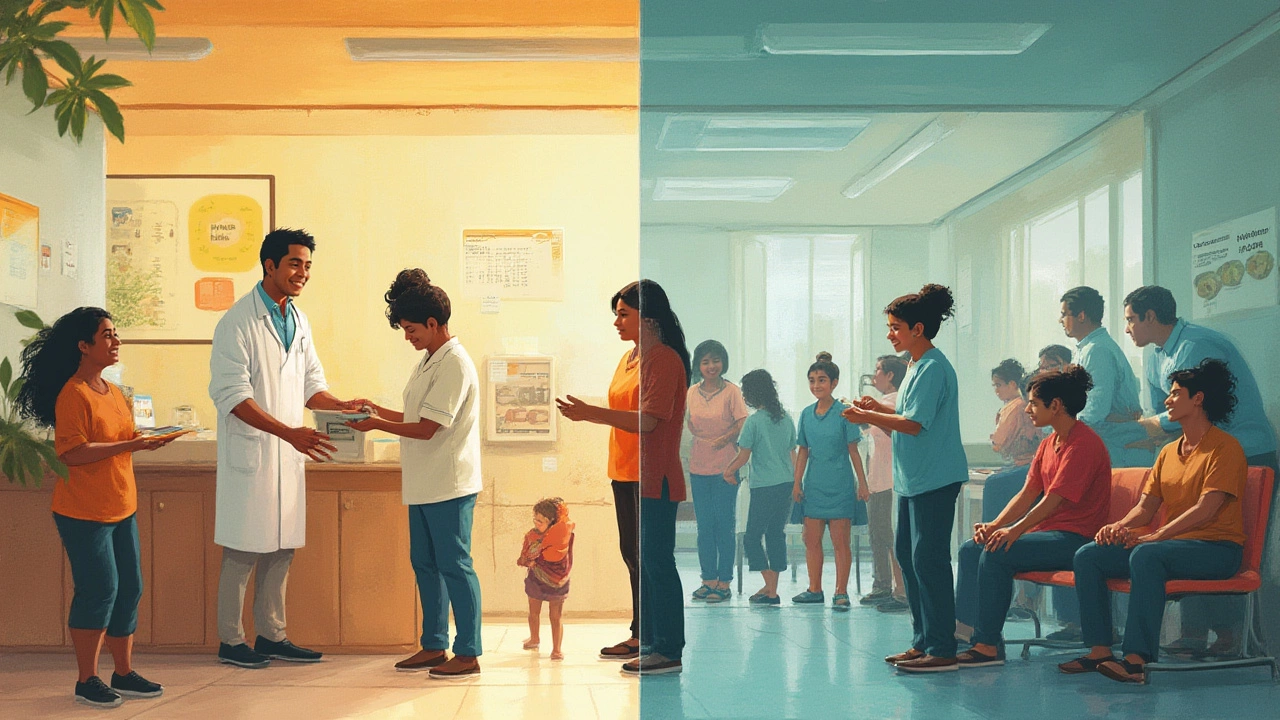-
6

Costa Rica Healthcare vs US: Surprising Insights and Truths
Anyone who's paid for a hospital visit or filled a prescription in the United States has probably fantasized about escaping to someplace where medical bills don't show up like final boss fights in a video game. Not long ago, my buddy sent me a meme: "Why get health insurance when you can get a one-way ticket to Costa Rica and fix your teeth for the price of an oil change?" I laughed, but it wasn't just a joke. People are asking if Costa Rica actually has better healthcare than the US. If you're picturing coconut trees next to MRI machines, you might be both more and less right than you think.
How Costa Rica’s Healthcare System Actually Works
The first thing that surprises most people: Costa Rica’s healthcare system is both public and private, and the public system isn’t just for citizens. They call it "La Caja"—short for the Costa Rican Social Security Fund. Every citizen (and legal resident) pays into it with their taxes, and in exchange, you're covered for doctor visits, hospital stays, prescriptions, surgeries... the whole menu. You sign up, pay your dues (based on income), and they're strict about it. My friend Peter, who moved there last year, is an artist and pays less than $70 a month for full coverage. For comparison, according to KFF.org, the average monthly cost of health insurance in the US (2023) was around $456 for an individual—with tons of out-of-pocket costs on top.
Don’t think La Caja is perfect, though. It’s like Canada’s system—comprehensive, but sometimes slow. Patients get routine care without crazy bills, but if you need a procedure that’s in high demand, you might end up waiting weeks or even months. The difference is, nobody hands you a bill that means selling your house. Emergency care? Immediate, and no one cares about your bank account. For those who want faster service and English-speaking staff, private hospitals are widely available. And here’s a wild fact: many doctors working private shifts are the very same highly-trained specialists from the public hospitals, switching back and forth throughout the week.
For expats and retirees, this is a dream setup. Once you get residency, you can pay into the system; otherwise, you pay out of pocket for private care. But here’s another kicker: even private clinics charge a fraction of what American healthcare charges. An MRI might set you back $400 in Costa Rica, while the same scan in the US could hit $2,600 without insurance.
| Costa Rica (Public) | US (Average, 2023) | |
|---|---|---|
| Monthly insurance (individual) | $70 or less | $456 |
| Primary care visit | $0 (with La Caja) | $100+ |
| MRI (out of pocket) | $400 | $2,600 |
| Prescription (generic statin) | $2 | $30 |
It sounds dreamy, but I know what you’re thinking: does cheaper mean worse?
Quality: Doctors, Hospitals, and Real Outcomes
This is where things get interesting. Costa Rica punches above its weight. The World Health Organization once ranked Costa Rica’s health system higher than the US’s on several metrics, including access and equity. More recent reports peg Costa Rica's life expectancy at about 80 years, which edges out the States. That’s wild, considering Americans spend double (or triple) the percentage of GDP on healthcare.
Costa Rica invests heavily in preventive medicine. They’ve got neighborhood health clinics everywhere, known as EBAIS, staffed by teams that know their patients personally. When my cousin visited and caught a nasty stomach bug, she saw a doctor at an EBAIS within hours—free, quick, and with medication in hand. Rural areas sometimes see shortages, but the country has worked hard to keep even remote mountain villages in the loop.
But what happens if something big goes wrong? Private hospitals like CIMA in San Jose, Clinica Biblica, and Hospital Metropolitano look like high-end hotels. The equipment is modern, the staff often U.S.-trained, and you get your results fast. Medical tourism is booming for a reason: people fly in from the States for hip replacements, dental work, and cosmetic surgeries. As Dr. Roberto Herrera, director of Hospital CIMA, told The Tico Times:
"We deliver the same level of technology and safety you’d find in leading hospitals in the United States, but at a much lower cost."
That said, the US is top dog for cutting-edge medicine and the most complicated procedures—think cancer treatments, rare surgeries, or emergency trauma care after a car crash. You’ll find exceptions, but if you’ve got a rare disease, the world's best specialist is probably at Johns Hopkins or Mayo Clinic. But for the majority of basic to mid-level care? Costa Rica’s got game. Infant mortality is lower than the U.S. rate. Vaccination rates are impressively high, and so’s satisfaction. The expats I know often rave that they actually see the same doctor each visit—hard to get that in the States unless you pay concierge fees.

Money Matters: Costs, Insurance, and Surprises
Let’s talk about the numbers, because the sticker shock is real. Even without insurance, private healthcare in Costa Rica can be less expensive than what people pay with insurance in the US. Lots of Americans show up for "medical tourism"—and not just for a deal on dental crowns. You’ll find whole neighborhoods of English-speaking retirees who schedule their annual checkups, dermatology visits, and dental cleanings alongside their surfing lessons. And when you see a shiny private hospital, know that many of its doctors got their training in both Costa Rica and the US.
The number one tip: even if you’re only visiting, grab private travel insurance or an international health plan. For legal residents, "Caja" is automatic, and you can top it up with a private plan that covers things public insurance won’t—like instant access or a private room. Retirees (pensionados) often pay less than $100 monthly for full public health coverage (no exclusions for age or pre-existing conditions), and they all tell my wife the same thing: "We get more peace of mind than we ever had back home."
Not all costs are sugar and spice. Imported medications and niche specialists can run high. A few high-end imported drugs cost more than in the States, and complex surgeries, such as some neurosurgery or cardiovascular operations, may be referred back to the US. But for standard surgeries, births, and emergencies, you’ll almost always pay less out-of-pocket, and surprise bills are rare. Nobody stresses about going bankrupt; nobody brags about their GoFundMe page for a broken arm.
If you’re a family person (like me), here’s a neat insight: Costa Rica places huge value on preventive pediatric care. Kids’ checkups, vaccines, and hospital pediatric wings are as good as anything I’ve seen for Vihaan back home. For U.S. families on high-deductible health plans, that’s tough to beat.
Things You Should Know Before Choosing Costa Rica For Health
Breezing through paradise with no medical worries sounds great, but before you start packing, there are a few honest realities worth mentioning. First, language can be a real hurdle. Staff at public clinics usually speak Spanish; English is more common in private hospitals, especially in San Jose and tourist towns. If you don’t speak Spanish, bring a translator (or use Google Translate). My friend learned the hard way after being prescribed cod liver oil instead of cough syrup for his kid. Always double-check.
- Bring copies of your full medical history before moving or extended stays. Costa Rica has excellent care, but transferring records is still old-school paper-based.
- Emergency response times are good in city areas. Out in the jungle, an ambulance may take a while. But almost every community has a small clinic, and you’ll usually see a doctor quickly—in the US, you might still be sitting in a waiting room reading 2012 magazines.
- Pharmacies play a huge role. Pharmacists are trained to handle a broader range of minor complaints, and you can get meds over the counter that are prescription-only in the US. But ask before accepting antibiotics—there are rules, but enforcement is loose outside of big cities.
- Public care = wait lists for non-life-threatening surgeries. Private care = shorter wait, bigger bill (still much less than US prices).
- If you’re visiting short-term and don’t have Caja coverage, you’ll be paying cash up front, but bills are transparent and usually low. My dental cleaning cost less than Milo’s grooming back home.
- Costa Rica is not free of limitations. If you have complex or rare conditions, keep a stateside plan or supplemental international health insurance just in case you need to fly home for advanced care.
So, does Costa Rica have better healthcare than the United States? If "better" means fewer bankruptcies, lower stress, and good basic-to-intermediate medical care, then yes—at least for everyday stuff. You might not get robot surgery or a Nobel Prize winner as your doctor, but you’ll definitely find a system where being sick doesn’t mean losing your house. Plenty of expats and locals are healthy, happy, and living longer than many Americans. You might miss some US bells and whistles, but when your biggest medical fear is misunderstanding the nurse’s Spanish, maybe you’re already winning.